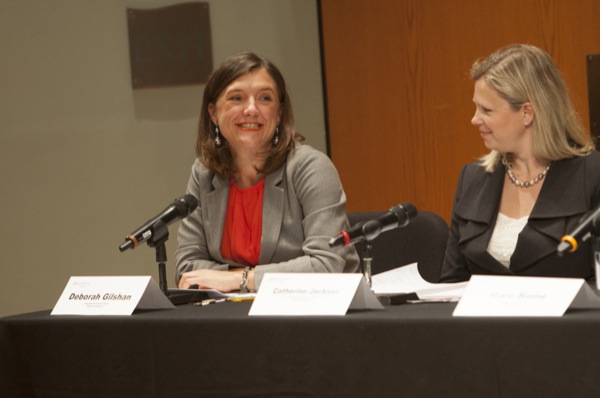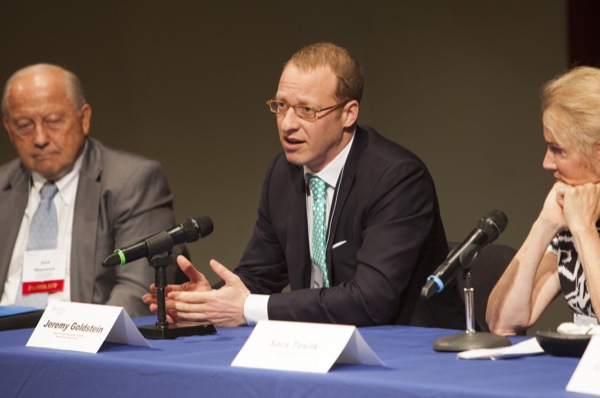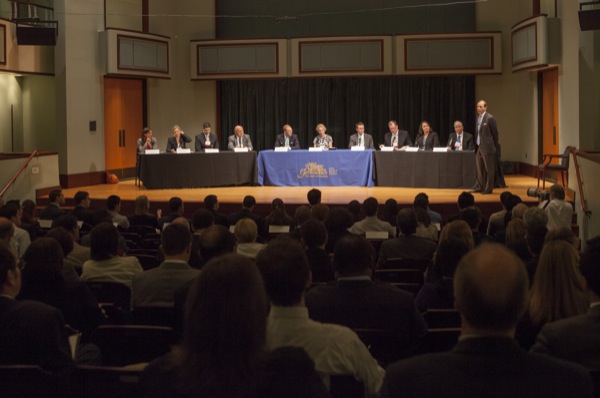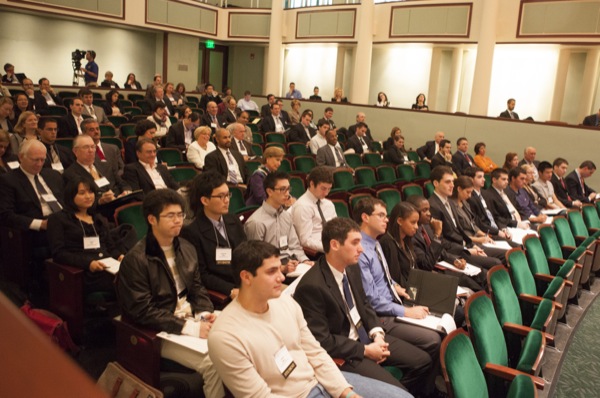

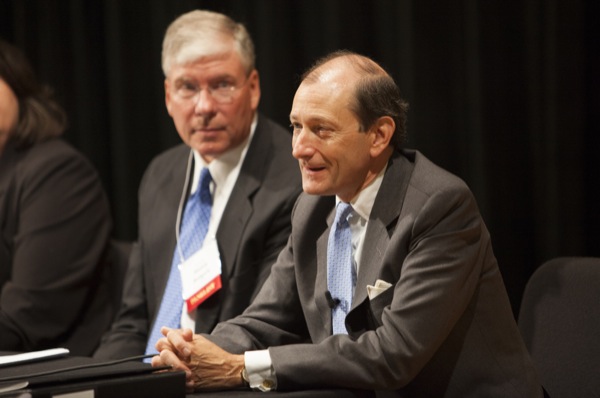
Director-shareholder engagement
Weinberg panel discusses benefits, challenges of director and shareholder engagement
12:49 p.m., Nov. 9, 2012--With the onset of the financial crisis and new federal laws that require shareholders to vote for corporate leadership, the University of Delaware’s John L. Weinberg Center for Corporate Governance recently hosted a panel discussion to address the increased national attention director and shareholder communication is receiving.
The panel “Director-Shareholder Engagement: Limits and Possibilities,” was held Thursday, Oct. 11, on UD’s Newark campus to explore the relationship between corporate directors and shareholders.
People Stories
'Resilience Engineering'
Reviresco June run
Because of new legislation like the Dodd-Frank Act, a number of governance organizations and experts -- including constituents like directors, institutional shareholders, activist shareholders, corporate management, regulators and lawyers -- have expressed interest in extending the communication between directors and shareholders and the role such communication should play in making major company decisions.
A group of 10 such constituents participated in the panel, including Donna Anderson, vice president and corporate governance specialist, T. Rowe Price; Glenn Booraem, principal at Vanguard and controller, Vanguard Funds; Peter Gleason, managing director and CFO, National Association of Corporate Directors; Deborah Gilshan, corporate governance counsel, Railpen Investments; Jeremy Goldstein, partner, executive compensation and benefits, Wachtell, Lipton, Rosen and Katz; Jon Hanson, founder and chairman, The Hampshire Companies; Catherine Jackson, corporate governance adviser, PGGM Investments; Henry Ridgely, justice, Supreme Court of Delaware; Sarah Teslik, senior vice president, policy and governance, Apache Corp.; and Marc Rome, vice president for corporate governance, Chesapeake Energy Corp.
According to Charles Elson, director of the Weinberg Center and moderator of the panel, the trend picked up momentum over the last 20 years, beginning with Phillip Morris International.
“The movement has really developed as we’ve seen a tremendous amount of dialogue between management and large shareholders,” explained Elson, who is also Edgar S. Woolard, Jr., Chair in Corporate Governance. “Now we’re moving into a new regime — the event of directors meeting with shareholders.”
Corporate management and stockholders alike have been questioning the importance of such communication and searching for the most effective ways to express it. For example, they question whether emphasizing the relationship is simply good practice or a legal and fiduciary obligation.
“There is a real shift in sentiment as many shareholders have an appetite in direct dialogue and really welcome it,” said one corporate council member. “The board’s rule is to represent the shareholders and this rule requires a high performing board with all the directors contributing to the process.”
Like the panelist, some constituents agreed the board’s representation of shareholders is critical and does not change from a shareholder perspective, regardless of the market invested in.
Other panelists said they felt that extending the relationship between directors and shareholders clarifies communication discrepancies that come along with the Say on Pay vote.
While they agreed that shareholders’ votes are necessary to keep a company functioning, panelists also noted that voting for leadership is one of the most important factors on the Say on Pay ballot because fortifying a bond between directors and shareholders requires engaging in conversation that leads to a relationship to impact decision making.
“A negative vote in a director election on a Say on Pay vote can communicate a desire for change but it doesn’t really offer a lot of guidance on what form that change should take,” articulated a corporate governance representative. “Without engaging, companies risk going in the wrong direction, undergoing change that isn’t satisfactory or even overreacting.”
Although most panelists agreed on the importance of director and shareholder communication, the discussion highlighted some of the barriers to effective engagement.
In particular the panelists felt both proxy statements and a lack of company communication policy make it difficult for the two sides to communicate in a clear and succinct manner.
To assess how management is paid, firms require proxy statements when soliciting votes in advance of annual meetings. These statements can result in 80-page documents management teams interpret as complex and over-regulated, said the panelists. This opens the potential for imprecise communication between directors and shareholders.
Panelists also discussed the return on investment when engaging with shareholders and agreed that the quality of communication should be effective. One panelist mentioned his company can host up to 400 annual director-shareholder meetings a day, which tend to be brief and concise.
While the panelists shared a general consensus that engagement should occur, their opinions varied on the degree and methods in which such engagement should happen.
“I think if this panel had occurred six months ago you probably would have heard less agreement,” commented Ann Mule, associate director for the Weinberg Center and organizer of the event. “The issue of director-shareholder engagement is evolving in the U.S. as you start to see more of a consensus among all the participants in the circumstances.”
While there is no one-size-fits-all for a company, the panelists agreed director and shareholder relationships are in an exploratory stage.
According to corporate governance council representatives, when it comes to meeting with directors, shareholders should aim for quality of discussion over quantity. Although the extent of this relationship has no true legal obligation, panelists emphasized the importance of working together to conduct productive meetings to maintain open communication.
“It’s a two way street — as a director, you can say you’ll talk to shareholders but they’ll have to come forward,” said Elson. “You’ll be hard-pressed to find a director today who would absolutely refuse to meet with a shareholder. Simply listen to what others have to say. If you limit what you’re going to hear, you will ultimately limit your effective judgment.”
The Weinberg Center hosted another panel discussion on Nov. 9.
Article by Danielle DeVita
Photos by Ambre Alexander




